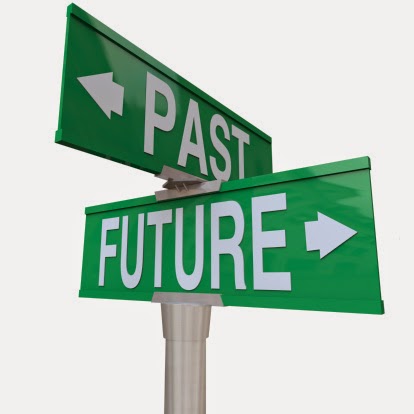Why are the people in charge of our society right now so afraid of history? And in being so afraid, have become dismissive of the importance of history as a continuum of events in succession leading from the past to the present and into the future. To my mind, the people who are making the biggest decisions for all of us right now — corporate leadership — are threatening the very core of our cultural and spiritual health by being so afraid of history.
 |
| you can’t have one without the other |
After I told him I was being laid off from the company at which I worked for 19 years, a friend (who’d himself been laid off six months prior from the same company) remarked “My god, they’re getting rid of the history.” And he was right. In the past few years, I’ve been all too aware of corporate America acting from a state of panic, not sure what to do next to make even more money, not sure what to do next to keep their shareholders holding shares, not sure what to do next to stay in business. I think such fear for one’s very existence leads to shortsightedness, leads to blindness. But instead of turning to the people in their companies who have vision — by virtue of their expansive knowledge of the world, their breadth of experience, their broad view of what’s come before and what’s happening right now — instead of asking these people to help them see a clearer path to the future, corporations are ridding themselves of these people, to make way for people who are younger and who are, they think, besides being less expensive, quicker, sharper, more willing to bend and flex, more adept to embrace and manipulate the future.
But it seems to me these younger people, while definitely bright, eager and wide-eyed (which is what we want in young people!) are wandering around without guides to actually show them how to read the complex maps, to negotiate the terrain, to maneuver the pitfalls. So for all their wide-eyed enthusiasm and sharpness, these young people are themselves still blind. For corporations to calculatingly disallow those who would be mentors to contribute to opening the eyes of these young Turks is, in effect, a sure way for businesses to gouge out whatever eyesight they have left. Granted, we have to assume and hope that the younger generations will learn to see — they always do — but at what cost right now? And what, exactly, will these people be seeing when they don’t have a clear view of how what came before matters, and so too, in what direction and to what end will these new corporate leaders actually lead our society?
I have to admit, I was never much for history in school and I was never much for sitting around listening to stories my grandparents told about the olden days. But in business, I was mentored in such a way that as a business executive, the mission came naturally to me to know what and who happened in the past and what the results were of such, in order to cultivate a long view for the future, to avoid the mistakes, to embrace the new, to stay sharp, to be flexible. I think there’s power in being able to flex between the past and the present, to stretch to the future. That’s called vision. How corporations have become so afraid of that sort of vision, so wary of the value of people with that vision, I don’t know. As far back as Homer, though, people in power have feared the visionary, the soothsayer. There are many who may well tell me to go back to reading my Homer and leave the matter of business to others now. Well, so be it. I’ll be the one downloading Homer onto my Smartphone, ok?